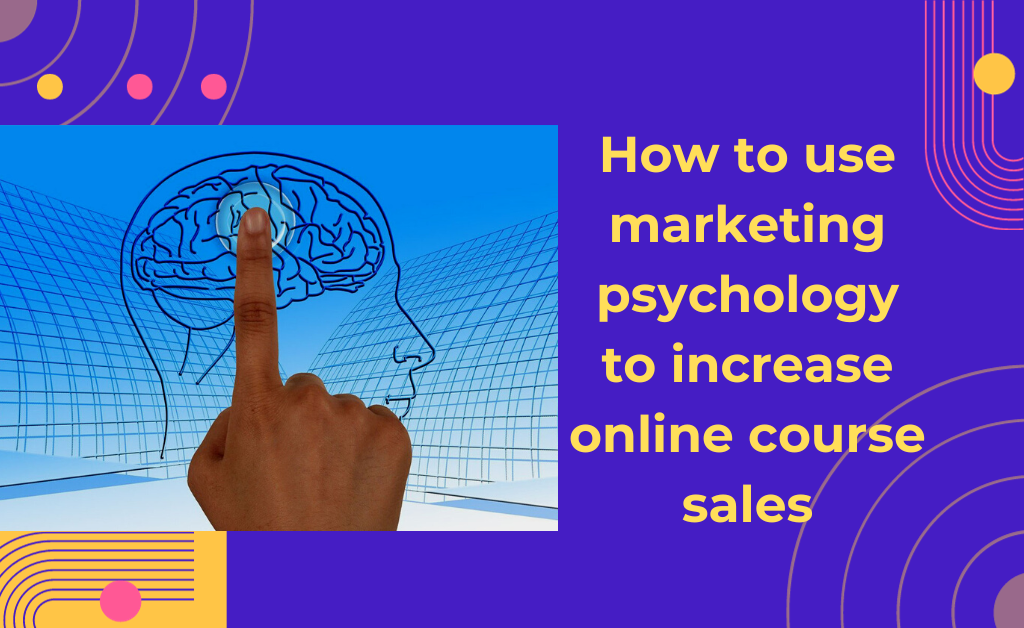The Role of Psychology in Marketing
Marketing starts in the mind.
-
How to use marketing psychology
- Tip 1: Know Your Target Audience and Their Motivations
- Tip 2: Utilize Social Proof to Build Trust and Credibility
- Tip 3: Create a Sense of Urgency and Scarcity with Limited-Time Offers
- Tip 4: Implement Persuasive Copywriting Techniques to Highlight Benefits and Overcome Objections
- Tip 5: Leverage the Power of Emotional Appeals to Connect with Your Audience on a Deeper Level
- Tip 6: Optimize Your Sales Funnel for Maximum Conversions and Retention Rates
- Teach them the way
- Conclusion
Here is our guide on how to use marketing psychology to increase online course sales. Understanding consumer behavior is the starting point of an effective marketing strategy. By delving into the why and how people decide on a purchase, you can tailor your promotional campaign for increasing online course sales through marketing psychology.
By employing persuasive techniques such as social proof, scarcity, reciprocity, and authority, marketers can nudge potential customers towards clicking “enroll now”. These strategies aim to create a sense of urgency or desire that encourages individuals to take action.
Convert potential customers into returning students with our online course sales psychology tips!
How to use marketing psychology
Tip 1: Know Your Target Audience and Their Motivations
Understanding your target audience is essential for any business or marketing strategy, particularly when you’re learning how to sell online courses from your own website. By conducting thorough target audience analysis and creating customer personas, you can gain valuable insights into the needs, preferences, and motivations of your potential customers.
Customer personas are fictional representations of your ideal customers. Created based on research and data collected from your existing customer base or through market research, these personas enable you to grasp your audience’s demographics, interests, behaviors, and pain points. By identifying common characteristics among your target audience, you can tailor your messaging and marketing efforts to resonate with them effectively.
Market research is pivotal when crafting online courses. It involves analyzing the competitive landscape, identifying trends in the industry, and assessing demand for specific topics or skills. This research helps you pinpoint gaps or opportunities in the market that can inform the development of your courses.
To truly understand the motivations of your target audience, it’s crucial to delve deeper than surface-level demographics. Exploring their psychographics—their attitudes, beliefs, values, goals, and aspirations—provides a holistic understanding of what drives them. Uncovering these motivations allows you to create compelling content that connects with them on an emotional level.
Tip 2: Utilize Social Proof to Build Trust and Credibility
Social proof is like a resumé for your product or, in this case, an online course. Testimonials and reviews build trust and credibility for who and what you are. Showcase positive feedback from satisfied customers and you have already told your target audience a lot about yourself without preachy advertisements.
Testimonials are personal endorsements from customers who have had a positive experience with a brand. These can be in the form of written statements, video testimonials, or even ratings and reviews on third-party platforms. They provide potential customers with real-life examples of how others have benefited from a particular product or service.
Reviews, on the other hand, are feedback left by consumers on various platforms such as e-commerce websites, social media platforms, or review websites. They offer an unbiased perspective on the quality and performance of a product or service.
Both testimonials and reviews serve as social proof by reassuring potential customers that they are making an informed decision. When people see positive experiences shared by others who have already used the product or service, it builds trust and confidence in their purchasing decisions.
Using social proof in marketing has several benefits. Firstly, it helps overcome skepticism by providing evidence that others have had positive experiences with the brand. This reduces the perceived risk for potential customers and increases their willingness to try out the product or service themselves.
Secondly, social proof enhances credibility for businesses. It shows that they have successfully served previous customers and have a track record of delivering value. This credibility can differentiate them from competitors and attract new customers.
Finally, social proof contributes to word-of-mouth marketing. When satisfied customers share their positive experiences with others through testimonials or online reviews, it creates buzz around the brand and encourages more people to engage with it.

Tip 3: Create a Sense of Urgency and Scarcity with Limited-Time Offers
There are only three left! Order now!
Few marketing strategies are as effective as creating a sense of urgency.
One effective way to create urgency is by utilizing limited-time offers and countdown timers. Limited-time offers create a sense of scarcity, making customers feel the need to act quickly before missing out on a great deal. Incorporate a countdown timer offer on your website. If someone browsing has stayed long enough to consider buying your online course, chances are a time-sensitive incentive will help them make that one extra click to close the deal.
Tip 4: Implement Persuasive Copywriting Techniques to Highlight Benefits and Overcome Objections
Persuasive copywriting is a fancy way of emphasizing the need for urgent language in your copy. One effective approach in this realm is benefits-focused messaging. By highlighting the specific advantages and value that your online course offers, you implement online course sales psychology without overdoing the in-your-face advertising.
Benefits-focused messaging centers around communicating how a product or service can improve the lives of customers. Instead of solely focusing on features or technical details, it emphasizes the positive outcomes and solutions that the offering brings. This approach helps customers understand how their needs or problems can be addressed by what is being promoted.
The benefits-focused messaging strategy leverages emotional appeal and taps into the desires and aspirations of the target audience. It enables copywriters to create a strong connection with potential customers by showing them how their lives can be enhanced through the use of a particular product or service.
There are several key advantages to employing benefits-focused messaging in persuasive copywriting. It allows copywriters to clearly communicate the unique selling points of a product or service, differentiating it from competitors in a crowded marketplace. This also emphasizes benefits over features, making your marketing messages more relatable and appealing to potential customers.
Furthermore, benefits-focused messaging helps address customer pain points directly, demonstrating how a product or service can provide practical solutions to their needs or challenges. This approach creates a sense of urgency and compels individuals to take action as they realize how much they stand to gain from making a purchase.

Tip 5: Leverage the Power of Emotional Appeals to Connect with Your Audience on a Deeper Level
Emotions speak louder than words.
One of the key aspects of emotion-driven marketing is understanding the psychological triggers that influence consumer behavior. By leveraging emotions such as joy, fear, sadness, or excitement, marketers can capture attention and evoke a desired response. This can be achieved through compelling storytelling techniques that weave together relatable characters, engaging plotlines, and impactful visuals.
Storytelling allows brands to humanize their products or services by placing them within meaningful narratives. Create an emotional connection with consumers through stories that reflect their values, aspirations, or challenges, and you have instantly established trust. These narratives also help differentiate a brand from competitors by highlighting its unique selling points in a more engaging and memorable way.
In addition to capturing attention and building relationships with customers, emotion-driven marketing tactics can also drive purchasing decisions. Studies have shown that consumers are more likely to make buying choices based on how they feel rather than logical reasoning alone. By appealing to emotions in marketing campaigns through relatable stories, brands can influence decision-making processes and increase conversion rates.
It is important for businesses to carefully plan their emotion-driven marketing strategies to ensure authenticity and alignment with their brand values. The use of data analytics tools can help identify target audience preferences and sentiments to create personalized campaigns that truly resonate.
Emotion-driven marketing tactics combined with effective storytelling techniques provide online course creators with a powerful means to connect with students on an emotional level. Evoke emotions such as empathy or inspiration through well-crafted narratives and you are already on your way to garnering loyal customers.
Tip 6: Optimize Your Sales Funnel for Maximum Conversions and Retention Rates
The sales funnel: those two, illusive buzz words that every marketer uses but are not often clearly defined. Basically, any strategy or media you use to drive traffic to your website and ultimately your online course, are part of your sales funnel.
It’s all about conversions. By implementing effective upselling and cross-selling strategies, online course creators can maximize their revenue potential and provide additional value to their students.
Upselling involves offering a higher-priced product or service to a customer who has already made a purchase. In the context of online courses, this could mean offering an advanced online course or a bundle of related online courses at a discounted price. Upselling not only increases the average order value but also allows students to continue their learning journey and deepen their knowledge.
Cross-selling, on the other hand, involves recommending complementary products or services that enhance the student’s learning experience. For instance, if you offer an online course on photography, you could cross-sell photography equipment or editing software that aligns with the online course content. Cross-selling not only generates additional revenue but also provides convenience for students by offering all the necessary resources in one place.
To optimize your sales funnel for online courses and implement successful upselling and cross-selling strategies, consider the following tips:
1. Understand your audience: Conduct market research to identify your target audience’s needs, preferences, and pain points. This will help you tailor your upsells and cross-sells to match their interests.
2. Offer relevant upgrades: Ensure that your upsells are closely related to the original purchase. Present them as valuable additions that enhance the student’s learning experience or provide advanced knowledge in a specific area.
3. Provide incentives: Offer discounts or bonuses for upgrading or purchasing additional products/services within a specific timeframe. Limited-time offers create a sense of urgency and encourage immediate action.
4. Personalize recommendations: Leverage data analytics and automation tools to segment your audience based on their preferences and behavior patterns. This will allow you to deliver personalized upsell/cross-sell recommendations tailored to each individual’s needs.
5. Communicate value: Clearly communicate the benefits and value proposition of your upsells/cross-sells. Highlight how these offerings will further support the student’s goals and help them achieve better results.
6. Optimize your sales funnel: Continuously analyze and optimize your sales funnel to identify any bottlenecks or areas for improvement. Test different upsell/cross-sell offers, placement, and messaging to determine what resonates best with your audience.
Teach them the way
All of these strategies combined might seem overwhelming at times, but just remember the goal of any marketing campaign is to drive more traffic to your product or online course.
So, in short, try different strategies and stick with the ones that bring in results, a.k.a. online course sales!
When you need a little inspiration, come back to this post for strategies on how to use marketing psychology to increase online course sales. Among these tips, you will continually discover ways to boost your online course sales.
Conclusion
Harnessing the power of psychology in marketing is key to skyrocketing your online course sales. By understanding your audience, utilizing social proof, creating urgency, employing persuasive copywriting, tapping into emotional appeals, and optimizing your sales funnel, you can elevate your course to new heights. At Owwlish, we provide the perfect platform for your course to shine. With intuitive features and expert support, we empower you to focus on what you do best – teaching. Seize this opportunity to transform your passion into profit. Embrace Owwlish and watch your course thrive!
Related Topics: How To Create and Sell Online Courses with Shopify





